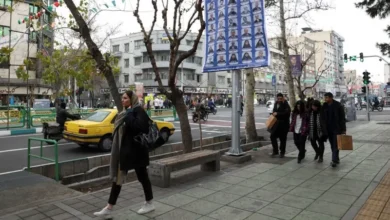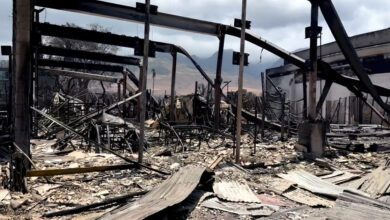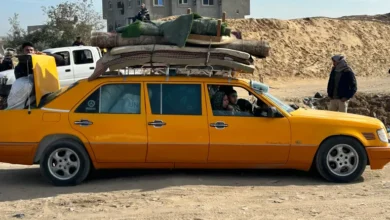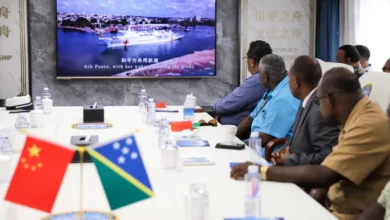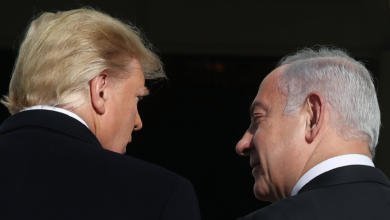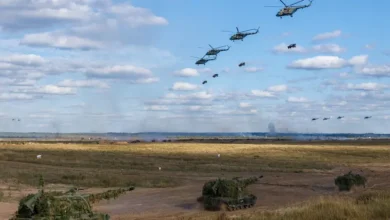‘Without journalists, war crimes remain unwritten’
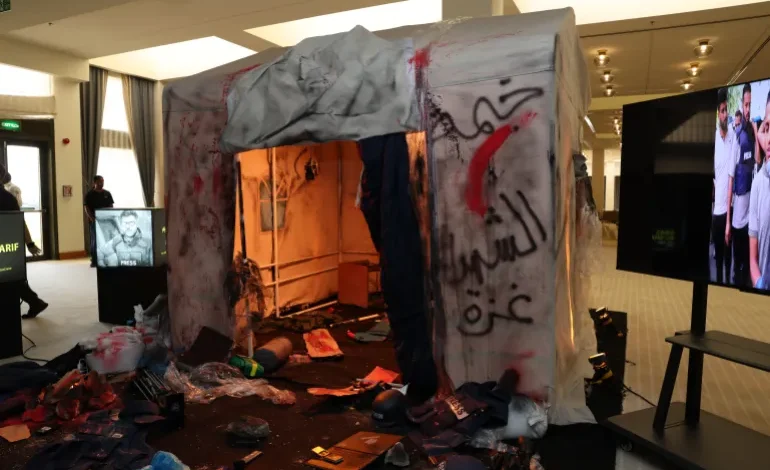
A small tent held up by flimsy tarpaulin stands alone, surrounded by bloodied and tattered blue helmets and vests with the word “PRESS” marked across them. Smashed cellphones, laptops and camcorders, and debris lie scattered around it in what could be a scene from a warzone.
But this is not a warzone. It is an installation setting the scene for a two-day conference organised by Al Jazeera, which began on Wednesday to highlight the terrible dangers faced by journalists working in armed conflicts.
The installation has been positioned in front of the angular conference hall of the Sheraton Grand hotel, a brutalist building that stands in Doha’s upscale West Bay neighbourhood.
Inside, an LCD screen is playing footage of Al Jazeera’s journalists wearing those blue vests and jackets, reporting in Gaza. It then cuts to Israeli Prime Minister Benjamin Netanyahu patting an Israeli military soldier on the back before footage of protesters carrying Palestine flags and posters calling Netanyahu a war criminal.
To the side of the hall, a panel listing the names and pictures of Al Jazeera’s journalists who have been injured or killed while reporting on Israel’s war in Gaza, over which Hamas and Israel have now agreed to the first stage of a peace process, appears. The panel is horrifyingly long, spanning the entire length of the hall.
Most recently, Al Jazeera journalist Anas al-Sharif was deliberately killed by an Israeli attack on a tent housing journalists in Gaza City on August 10. That assault also killed an Al Jazeera correspondent, two Al Jazeera camera operators, a freelance cameraman and a freelance journalist.
It is a painful reminder that the war on Gaza, in which nearly 300 journalists and media workers have been killed, according to the Shireen Abu Akleh Observatory – including 10 from Al Jazeera – is no isolated case of journalists losing their lives while reporting in conflict zones.
Gaza has marked a turning point for journalists, however, Louise Alluin Bichet, director of projects and emergency response at Reporters Without Borders (RSF), told the conference on Wednesday.
While reporters once relied on the sorts of bulletproof vests seen strewn at the entrance to the conference to shield them from accidental injury, as they performed their jobs amidst and on the sidelines of conflict, she said, they are now being deliberately targeted.
“It does not matter what kind of body armour you’re wearing.”
As Maryam bint Abdullah Al-Attiyah, chairperson of the National Human Rights Commission (NHRC), highlighted, international law has been flouted in the Gaza war and “journalists have been targeted and killed.”

